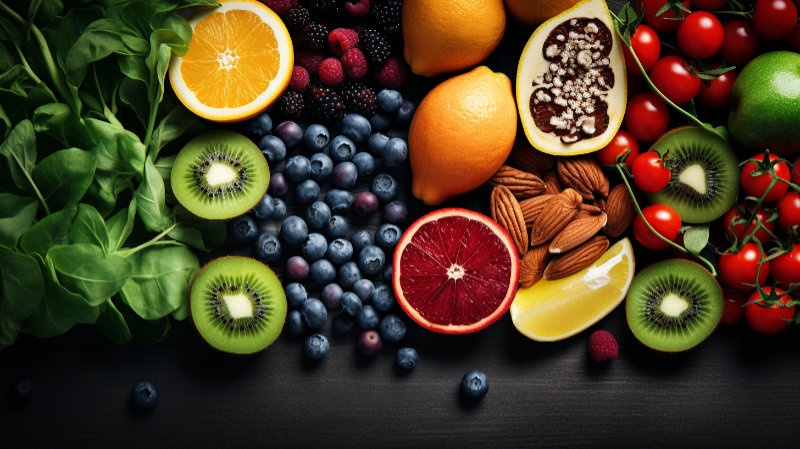Intro: Nutrition 101 for Runners
Have you ever considered what drives legendary ninjas to their greatness? Is it sheer willpower, secret techniques, or stealth tactics? While all these elements play a part, an unsung hero in their world nutrition! Yes, before leaping from rooftop to rooftop or silently dashing through forests, they need fueling up like runners like us do.
Starting to run is like taking up martial arts training: Your body needs nourishment just like the blade does! Unfortunately, many novice runners can get caught up in the excitement of running miles alone, neglecting its nutritional requirements. Don’t fear! “Nutrition 101 for Runners” will reveal all the secrets to fueling up like a Ninja Runner! Ready yourself for an amazing journey through vitamin valleys, mountains of macronutrients, and rivers of hydration as you make your way toward the dojo of dietary wisdom!
The Basics of Nutrition
Ninja runners, let’s enter the realm of nutrition like ninjas do–unnoticed! Understanding its basics is vital for Ninja Runners and any runner striving to maximize their potential; hence, “Nutrition 101 for Runners,” is your scroll of knowledge that delves deep into what fuels our bodies.
Macronutrients. No, they’re not giant ninjas – just essential nutrients our bodies require in large amounts: Carbs, Proteins, and Fats. When it comes to running, carbs serve as your main energy source, providing the kick needed for sprints or longer distance runs; proteins, on the other hand, serve as repair ninjas after intense runs or shadowy training, while fats often get overlooked are likewise old master ninjas: they store energy while supporting cell growth so you can keep on running day after day!
Nutrition 101 for Runners” goes beyond macronutrients alone. We must also account for micronutrients – vitamins and minerals that work behind the scenes to help energy production, bone health, and overall well-being – like hidden shurikens used by ninjas – which are integral.
Water, the very source of life, is over 60% of our body weight. Like a ninja who needs fluid movements for maximum effectiveness, staying hydrated ensures every part of you runs smoothly – whether sprinting through woods or racing up hills. Optimizing performance requires staying properly hydrated.
Fueling Before the Run
Start running without providing yourself with enough fuel, and it could turn into an adventure without proper planning. A proper diet before setting out can ensure your body has enough energy reserves to last throughout your race or marathon distances.
As part of Nutrition 101 for Runners, it’s essential to understand the significance of carbohydrates as your main energy source – think whole-grain bread, oatmeal, or bananas for quick energy release during early runs. These provide your body with the fuel it needs in a flash!
Protein plays a pivotal role in pre-run fueling. Carbs provide immediate energy, while proteins nourish muscles for post-run recovery. An almond butter spread on bread or some chia seeds sprinkled onto oatmeal can make a noticeable difference in how your muscles adapt during your run.
Timing is key. Aim to consume pre-run nourishment 30-2 hours before setting out for your system to digest and convert the food to energy you’ll soon require.
Hydration should also play a role. Beginning your run hydrated can make all the difference; however, keeping dehydration at bay may require taking in several sips at regular intervals; too much may leave you feeling uncomfortable and lead to dehydration.
Nutrition During Long Runs
Launching in the long run requires endurance, resilience, and strategy. Just as any trip requires provisions and planning for travel needs, so must it require nutritional planning when running for extended distances. Knowing “Nutrition 101 for Runners” could make the difference between hitting your goals or hitting an unexpected wall!
As your mileage accumulates, your body’s initial energy reserves from your pre-run meal diminish. That’s where easily digestible and quick energy sources come in handy; energy gels, chews, or even simple dried fruits can provide a much-needed boost. These quick sources ensure you maintain pace without fatigue while maintaining energy reserves for continued running.
Electrolyte balance is also critical during long runs; electrolyte tablets or sports drinks may help prevent cramps and maintain fluid equilibrium by replenishing lost salts and minerals through sweat, supporting muscle function while decreasing the risk of dehydration.
Be mindful that nutrition during running can vary based on an individual’s body, with what works for one runner possibly not working for another. Strive to find a balance between providing your body with what it needs while avoiding digestive discomfort; therefore, always test new nutrition strategies during training rather than on race day.
Nutrition during long runs can be crucial in helping runners maintain stamina, reduce fatigue, and recover more efficiently. Proper in-run nutrition can make all the difference for endurance athletes like runners. It gives runners more strength to go the distance.
Recovery Nutrition: Post-Run Meals and Snacks
The recovery phase begins once your run has concluded and your feet have had time to rest. New runners often overlook this phase; that is where “Nutrition 101 for Runners” really shines – to replenish what has been lost from exercise and set themselves up for their next run.
Your muscles have experienced significant wear and tear during a run, necessitating repair and rebuilding to restore them to health. Protein sources such as lean meats, tofu, eggs, and Greek yogurt contain essential amino acids needed for the repair and growth of muscles. Don’t forget carbs! Carbohydrates also help replenish glycogen stores within your muscle cells, preparing you for another adventure on the tracks – for instance, grill chicken with quinoa and veggies as a post-run meal; plant-based runners may enjoy having stir fry made up with brown rice as an option!
Hydration should always be your top priority after any run or workout session, with water being an ideal way to replenish lost salts and minerals. Consider an electrolyte drink for sweatier workouts to replenish any lost essential salts and minerals.
If a full meal isn’t immediately on the horizon, quick post-run snacks like peanut butter and banana sandwiches or protein shakes with added berries or oatmeal may do just the trick.
Your post-run nutrition sets the stage for future runs and training sessions, determining how well you recover and train in subsequent days. Prioritizing recovery nutrition ensures that each run represents progress rather than setbacks.
Everyday Eating Habits for Runner’s Health
Though pre-run fuel and post-run recovery are important components of running performance and health, don’t overlook the significance of your daily nutrition habits. After learning more about running nutrition via “Nutrition 101 for Runners,” I realized how vital daily consumption was for running performance and overall well-being.
First and foremost, aim for balance. A colorful plate can often indicate health. Include lean proteins, whole grains, healthy fats, and fruits/veggies to ensure you receive essential nutrients and avoid deficiency-driven deficiencies. A great example would be a salmon fillet served alongside steamed broccoli and quinoa with an olive oil drizzle as an example meal.
Hydration isn’t only important during exercise. Maintaining adequate hydration throughout the day helps with digestion and cognitive performance and keeps skin glowing – and no, coffee doesn’t count!
Staying satiated requires eating healthy fats like avocados, nuts, seeds, and olive oil; these tasty snacks are satisfying and essential in absorbing certain vitamins and boosting overall well-being.
Remember that runners require extra energy. As you increase your mileage, pay attention to how your body responds. If hunger becomes an issue as your mileage does, this could be a telltale sign that more caloric intake is necessary; make those calories count by opting for nutritious rather than empty-calorie options.
Adopting healthy daily eating habits will ensure that your workouts are running at maximum capacity and that life itself runs more smoothly. Every step toward wellness begins with eating well – take one nutrition-filled step today.
Special Considerations and Supplements
As part of “Nutrition 101 for unners,” it’s essential to acknowledge that even with careful planning, even the best diet may fall short or require special consideration due to training schedules, specific dietary restrictions, or individual health requirements. Therefore, supplements may become necessary at certain points to supplement nutrition intake.
- Vitamin D: For those living in areas with limited sunlight or during the winter months, taking a Vitamin D supplement may provide vital support for bone health, immunity, and mood.
- Iron: Female runners, particularly, may be at greater risk for having low iron levels, impacting performance and energy. Iron supplements should only be taken if an iron deficiency has been diagnosed, as too much iron could be harmful.
- Omega-3 Fatty Acids: Omega-3 fatty acids have many health benefits for cardiovascular and inflammation reduction and can be obtained either through fish oil supplements or plant-based sources like flaxseed oil for vegetarian or vegan diets.
- Protein Powders: While whole food should remain the primary source of protein, busy schedules or increased protein needs might necessitate supplementing it with powders from whey to pea protein sources for increased convenience and satisfaction. Options exist that meet various dietary preferences.
- Electrolyte Tablets: Electrolyte tablets may help those who engage in intense sweat sessions or lengthy runs to maintain their body’s salt balance and sustain optimal health.
- Calcium: Essential for bone health, particularly if you avoid dairy or are at risk for osteoporosis.
- B Vitamin Supplements: B Vitamin supplements are essential in energy production, providing runners extra support during intensive training.
Before adding supplements to your daily regimen, speaking to a healthcare professional is always advisable. Supplements shouldn’t replace eating healthily but can provide important additional nutrition where gaps exist.
Conclusion
We have finished this enlightening journey through “Nutrition 101 for Runners.” Every aspect of nutrition impacts running performance from fueling your body before and during runs to recovery nutrition and daily eating habits.
Considerations are unique to supplements and their potential role in upping your nutritional game, so understanding them, adapting, and staying informed are vitally important components.
Running is more than a physical test: It’s about nurturing and understanding your body. By being mindful about what fuel you feed, you are setting yourself up for better runs and a more fulfilling and healthier life.
So, as you lace up those sneakers and prepare to run your next mile, remember the power of nutrition! Run with intention, eat mindfully, and view every meal as an opportunity to nourish your inner athlete – here’s to many miles and delicious meals in the future!
Additional Resource(s)
- Ninja Runner: Nutrition Basics for New Runners: Fueling Before, During, and After Runs
- American College of Sports Medicine Nutrition Resources: https://www.acsm.org/education-resources/trending-topics-resources/nutrition




0 Comments